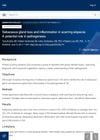 October 2023 in “Cognizance journal”
October 2023 in “Cognizance journal” The document suggests using natural remedies like bloodletting and honey for various health issues but lacks scientific evidence for their effectiveness.
 September 2023 in “International journal of Unani and integrative medicine”
September 2023 in “International journal of Unani and integrative medicine” Hair loss patterns are linked to temperament and can help diagnose it.
 June 2023 in “Sains Malaysiana”
June 2023 in “Sains Malaysiana” Cinchonine Nanostructured Lipid Carriers serum safely and effectively stimulates hair growth and increases the number and size of hair follicles.

Non-invasive methods can effectively diagnose and manage alopecia areata.
 January 2023 in “Bio web of conferences/BIO web of conferences”
January 2023 in “Bio web of conferences/BIO web of conferences” The document concludes that specific dermoscopic features can help diagnose different facial red skin conditions.
 January 2023 in “International Journal of Research Publication and Reviews”
January 2023 in “International Journal of Research Publication and Reviews” Some herbal ingredients like linalool and tea tree oil have anti-dandruff properties and are safe for use in shampoos.

Isotretinoin may cause temporary, reversible facial hair growth in some women.
 October 2021 in “Turkderm”
October 2021 in “Turkderm” Hormonal imbalances, not insulin resistance or dyslipidemia, may be more important in causing acne in women over 25.

Silk sericin dressing with collagen heals wounds faster and improves scar quality better than Bactigras.
 January 2019 in “Springer Reference Medizin”
January 2019 in “Springer Reference Medizin” Follicle Stimulating Hormone is important for fertility.

Botulinum toxin type A significantly reduces scalp psoriasis severity compared to placebo.
 January 2018 in “Elsevier eBooks”
January 2018 in “Elsevier eBooks” The document concludes that alopecia has significant social and psychological effects, leading to a market for hair loss treatments.
 January 2018 in “Springer eBooks”
January 2018 in “Springer eBooks” Terbinafine is the most effective medicine for fungal nail infections, especially for diabetics and those with weak immune systems.

Hair loss causes emotional distress, leading to high spending on treatments, with Minoxidil and Propecia being common but having side effects.
 January 2017 in “Clinical approaches and procedures in cosmetic dermatology”
January 2017 in “Clinical approaches and procedures in cosmetic dermatology” Cosmetic procedures can harm hair, but damage can be minimized with knowledge and care; however, once hair is damaged, it cannot be reliably repaired.
 January 2017 in “Clinical approaches and procedures in cosmetic dermatology”
January 2017 in “Clinical approaches and procedures in cosmetic dermatology” Retinoids are effective for skin conditions like severe acne and psoriasis but must be used with caution due to potential side effects and risks during pregnancy.

Forensic hair analysis for drugs is now more reliable and accurate.
 July 2015 in “British Journal of Dermatology”
July 2015 in “British Journal of Dermatology” Treating skin conditions with both psychological and dermatological care improves patient outcomes and can save costs.
 June 2015 in “Biomedical and biopharmaceutical research”
June 2015 in “Biomedical and biopharmaceutical research” The congress showed advancements in skin hydration, barrier function, and safe, effective new cosmetic formulations.
 March 2015 in “Plastic and reconstructive surgery”
March 2015 in “Plastic and reconstructive surgery” Human skin has multiple layers and functions, with key roles in protection, temperature control, and appearance.
 January 2015 in “Springer eBooks”
January 2015 in “Springer eBooks” Hair health is influenced by genetics, aging, and environmental factors, with proper care needed to maintain it.
 January 2015 in “Dermatology”
January 2015 in “Dermatology” The document covers various dermatological treatments and conditions.
 February 2013 in “Journal of the American Academy of Dermatology”
February 2013 in “Journal of the American Academy of Dermatology” A woman's hair loss looked like a different condition due to her hairstyle, and treatment stopped further hair loss but didn't regrow hair.
 January 2012 in “Elsevier eBooks”
January 2012 in “Elsevier eBooks” Hair transplantation is highly effective with careful technique and attention to patient needs.
 June 2008 in “Springer eBooks”
June 2008 in “Springer eBooks” The document concludes that permanent hair loss conditions are complex, require early specific treatments, and "secondary permanent alopecias" might be a more accurate term than "secondary cicatricial alopecia."
 February 2006 in “Journal of The American Academy of Dermatology”
February 2006 in “Journal of The American Academy of Dermatology” Terbinafine is more effective than itraconazole for toenail fungus, especially in older patients, and debridement improves its effectiveness.
 September 2004 in “Experimental dermatology”
September 2004 in “Experimental dermatology” Melatonin directly affects mouse hair follicles and may influence hair growth.
 January 1998 in “Lasers in Surgery and Medicine”
January 1998 in “Lasers in Surgery and Medicine” Lasers are effective and safe for various medical treatments, including cancer, wound healing, and skin conditions.

Loss of oil glands and inflammation might contribute to the development of scarring hair loss.

Some medications, including retinoids, antifungals, and psychotropic drugs, can cause reversible hair loss if stopped or doses are reduced.





























